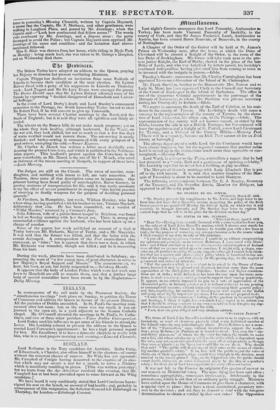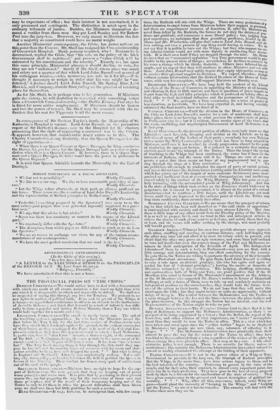St1is tella nto us.
Last night's Gazette announces that Lord Ponsonby, Ambassador to Turkey, has been made Viscount Ponsonby of Imokilly, in the county of Cork, and that Sir James Frederick Lamb, Ambassador to . Austria, has been created Baron Beauvale, of Beauvale, in the county of Nottingham.
A Chapter of the Order of the Garter will be held at St. James's Palace on Wednesday next, after the levee, at which the Duke of Cleveland will be elected a Knight of the Order, in the room of the late Duke of Buckingham. His Grace will take rank next to the pre- sent junior Knight, the Earl of Derby, elected in the place of the late Duke of Leeds, and who eras knighted by letters patent, his lordship's continued iudisposition having prevented him from coming to town to be invested with the insignia in person.—Globe.
Tuesday's Gazette announces that Mr. Charles Cunningham has been appointed Lieutenant-Governor of the Island of St. Christopher.
Mr. Frank Sherbian, brother to the Honourable Mrs. Norton and to Lady St. Maur, has 1;:'ea appointed Clerk to the Council and Secretary of the Court Of Exelaspter in the island of Barbadoes. The office is one of the numerous Colonial appointments in the patronage of the Marquis of Normanby, to whom 31r. Sheridan was private secretary during his Viceroyalty in Ireland.—Globe.
We regret to announce the death of the Earl of Caledon, at his resi- dence in the county of Tyrone. His Lordship's death will cause a vacancy in the representation of the county of Tyrone, by the eleva- tion of Lord Alexander, his eldest son, to the Peerage.—Globe. The representation of tl,e comity will not become vacant, as stated by the Globe, because the title is not a British Peerage ; but Government will have the appointment of a Knight of St. Patrick, a new Lord-Lieutenant for Tyrone, and a Colonel of the County Militia. —Morning Post. [There will be a vacancy, becausa an Irish Ner cannot sit for an Irish county or borough.] The abrupt departure of a noble Lord for the Continent would have been almost forgotte.n, but for the repeated ?amours that another noble Lord is mixed up in the transactions much more than agreeable or een..;- templated.—Horniug Post.
Lord Ward, in a letter to the Times, contradicts a report that he ma lost 200,000/. to a " noble Earl and a gentleman of sporting celebrity." His Lordship says that lie never lost a farthing at play to either.
The Marquis of Douro's marriage with Lady Elizabeth Hay is put off to the kith instant. It is said that another daughter of the Mars quis of Tweeddale is about to be married to Lord Blantyre.
'Pile following correspondence between Mr. E. J. Stanley, Secretary, of the Treasury, and Mr. Swynfen Jervis, Member for Bridport, has appeared iu all the daily papers.
MIL STANLEY TO MR. JERVIS.
"Whit...hall. March 27, 1839..
" Mr. Stanley pre cuts his compliments to Mr. Jervis, and begs leave to in-
form him I hit JoLn Russell's motion respecting the policy of the Irish Government is pm Toned till Monday the 15th of April, on which day it will certainly he brouLlit forward; and Mr. Stanley begs leave to express Ids earliest hope that he will be in his place fur the division en that day.
Mn. JERVIS TO MR. STANLEY.
Whitehall Place, April 9, 1839. "Dear Sir—Having been recently favoured with a communication from yon, on the subject of Lord John Ilut•sell's motion, which I observe now stands for Monday the 15th, I feel bound in fairness to trouble you with a few lines in reply, thr the porpose of removimn, ally misapprehension as to the course which I shall consider it my duty to take at this juncture. " Upon all Cornier occasions, whenever 1 could do so without compromising my opinions and peineiples as an earnest Reformer, 1 have voted with Minis- ters: and iftheir conduct as respi.os the executive administration of Ireland were all that we are now called upon to sanction, I 'night still, perhaps, con- sider myself justified in giving them my support,—though I cannot help think- ing that but a nnrrow and short-sighted policy which is beneficial to one sec- tion of the en wire inly, and that merely for the passing day, to•the neglect of •
a permnent and nnivet.ul interests.
"Rut the question which is 17..17 about to be raised in the House of Com- mons however it may L. gl.,ssed and disguised, involves MOM than the mere approbation of the irish railer of Ministers. Greater and higher considera- tions are at stake ; while Irelam.d, cc has been the case upon too many occa- sions, is made a c,aivenient sidnia,-hurse to support their waning popularity. It appears to Inc utterly impossille to juin in a vote of approbation of the Ministerial policy in Ireiand, selected as it is without reiinv:i re to any pending or contemplated measure, without indirectly sanctioning their general policy: and this, considering the conduct of Government with regard to the Ballot and many other iii;pdy important questions, 1 for one am not prepared to do. " Under these eiremustances,:ul imkimig at the question in its several lights and bearings, I think it right, liver much I may regret it, to inform you that I should!ba :meting vont ran- to my own convictions were Ito give my sup- port to Government in the diviCion of the
" I any dear Sir, your obliged and very obedient servant,
" Sw VtiVEN JERVIS."
The terms of Lord John Russell's resolution seem to us to express, with no immodesty or want of dearness, precisely what every individual member of the Liberal milmay may unhesitatingly admit. Every Reformer, not a mem- ber of the " Convention," may, without inconsistency, support the resolu- tion ; every Refiwiner iii Parlionn•nt is bamnmd to do so. Yes, even the " six- and-thirty placeineo.- or whom the Sp,‘•:aior has taken the trouble to make out a list, and whose salaries are sp.:( ilia d a: the slake which is dependent upon the vote, may vote mail this point it lilt the same effect and propriety as though they were as pliteele,,, a,; the SiKet.!lor would. like to see Ili. mm. Why should they not ? "The public will simply regard their votes as the means ul clutch- ing another quarter's salary." It so, how will the public regard time votes of thirty-six of their oppnents, who, should 11.ey triumph in the division, must succeed to the vacant places? Nay, on the ( 1,posit ion side, the public should count double thirty-six as votes is lueuced scaly by the idea of a quarter's salary ; for there are at least two expect:tins e every oflice.—Courier.
It was not left to the Courier to originate this species of answer to our remark on Ministerial votes. 'rile stint.. thing has been said often ; sometimes appropriately, sometimes irrelevantly. Irrelevantly in the present case, which is not that of an ordinary party struggle. Ministers have called upon the House of Commons to give them a character, with a special view to place : they have a clear, ascertained, pecuniary inte- rest in the decision ; and are they to demand a trial with the foregone determination to obtain a verdict by their own votes? The Opposition
•
may be expectants of office ; but their interest is not ascertained, it is only preswned and contingent. The distinction is acted upon in the ordinary tribunals of justice. Besides, the Ministers themselves de- mand a verdict from these men they put Lord Stanley and Sir Robert Peel into the jury-box. However, we only meant to illustrate the fact that a majority so constituted could have no moral weight.
Another Ministerial contemporary, the Globe, has juster notions on this point than the Courier. Mr. Shell has resigned his CommissionerShip of Greenwich Hospital. Many persons inquired, why? Because lie is determined, replied the Globe, that "his vote on the policy of the Irish Goveinment shall be to fettered," and possess a "value which will be estimated by his constituents and the country." Exactly sn ; but upon this same principle, Ministerial placemen stonld decline to vote, for they are not " unfettered." Surely if Mr. Shell, whose place was small and salary not a quarter of that which Lord John Russell and several of his colleagues receive,—who, moreover, was safe in it for life,—if he thought it necessary to resign in order that his vote might be " un- fettered," a finqiori should Lord John Russell, Mr. Spring Rice, Lied Rollick, and Company, abstain fromyoting on the queetion of retaining place for themselves.
As for INIr. Sheil, he is perhaps wise in his generation. If Ministers gain the victory, he will doubtless be rewertied with something better than a Greenwich Commissionership—the Dublin Evening Post says he
is fitted for more active employment. Ministers should be beaten and Jose the power of reward, Mr. Shell may be consoled with the re- flection that his seat for Tipperary is all the more secure.



























 Previous page
Previous page